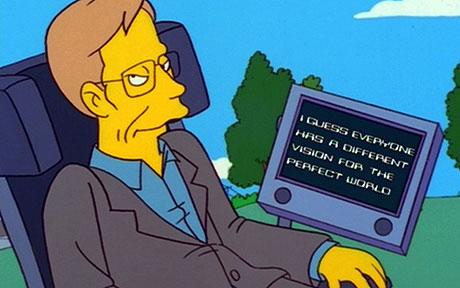With great loss comes a new degree of responsibility, the world of science has lost not just a great thinker but probably the biggest inspiration of the last century. The loss of Stephen Hawking at 76 years old is a sad day for anyone who has been inspired by his writing, his speaking even his presence, to think differently, to consider something beyond the normal and then to try to persuade others that the idea you have could become a new normal.
In 1970 his work on Black Holes moved us closer to understanding not just the science of how we are here but placed our minds in a position to understand the why. By 1974 he created a unified theory that combined general relativity with quantum mechanics, the next phase in computing, the Quantum Computer would not have been possible without this work. Satya Nadella wrote in his recent book that the best way to describe Quantum Computing and its impact would be to take a description of the Twilight Zone and apply it to a new world;
You’re traveling through an other dimension, a dimension not only of sight and sound but of mind. A journey into a wondrous land whose boundaries are that of imagination. That’s the signpost up ahead – your next stop…
The Twilight Zone by Rod Serling
Perhaps that is what professor Hawking really wanted us to do, travel with our minds to a new dimension.
By 1979 he had outlived his doctors predicted life expectancy by a decade. He was never going to give up challenging clinicians throughout the world by his sheer act of will to continue to exist. He outlived the clinical prediction of his existence by 47 years, he himself described those years as borrowed time he had to pay back.
In 1985 he found a new voice, one that he never wanted to loose despite changes in technology, one that became a trademark for a new intelligence. By 1988 A Brief History of Time was published, a real science book that would remain a best seller for four consecutive years and in 2018 will probably make many peoples hot lists of the year again. A Brief History of Time popularised science, physics and the art of describing complexity in simple terms to people who at school would not have ever been an achiever in science, me included.
If we find the answer to (why we and the universe exist), it would be the ultimate triumph of human reason – for then we would know the mind of God.
A quote straight from the best seller to me revealed the continuing battle inside Hawking to truly reach everyone and help them understand the meaning of life, above and beyond the Life of Brian definition.
1999 arrived and a pop culture icon was born; one of the worlds favourite ‘real’ characters on the Simpsons, his own TV series, a guest appearance on Star Trek the Next Generation and even a voice over on Pink Floyd’s album Division Bell, perhaps a higher accolade than D:Ream!
In 2004 his thinking on Black Holes continued however he proved that even the greatest can change their mind when he proclaimed loudly that he had altered his findings on what happens to information that ends up in a Black Hole, the theory that it flows to other universes was born, the dreams of every Sci-Fi geek came true.
Most recently Hawking asked the whole human race to take care when investing in theory around Artificial Intelligence, investing in a black box of uncontrolled knowledge needs to be done with some moralistic compass and control.
For me though Stephen Hawking was more than the sum of these parts, his voice, his uniqueness and the way he engaged generation after generation in what the world could be through science, through change and innovation is what his legacy will be
So remember to look up at the stars and not down at your feet. Try to make sense of what you see and hold on to that childlike wonder about what makes the universe exist.
RIP Professor Hawking, you rock!
